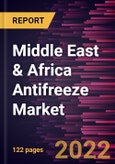The antifreeze market in the Middle East and Africa is witnessing notable growth driven by increasing automotive production, rising temperatures, and a growing emphasis on vehicle maintenance. As countries in the region invest in infrastructure development and urbanization, the demand for efficient cooling solutions in vehicles and industrial machinery has surged. The major factors driving the Middle East and Africa antifreeze market are the strong presence of the automotive industry and growing demand from the industrial sector, along with the increasing passenger vehicle production and rising middle-class incomes.
Based on the coolant type, the Middle East and Africa antifreeze market is segmented into ethylene glycol, propylene glycol, glycerin, and others. The ethylene glycol segment accounted for the largest Middle East and Africa antifreeze market share in 2023. Ethylene glycol is an alcohol-based organic compound commonly used as an anti-freezing agent in HVAC equipment, vehicle systems, and other applications. It is an odorless, colorless, and viscous liquid. Ethylene glycol possesses high heat transfer capabilities and is commonly used in various commercial and industrial applications, including antifreeze and coolant.
Based on the technology, the Middle East and Africa antifreeze market is segmented into inorganic additive technology, organic acid technology, hybrid organic acid technology, and others. The organic acid technology segment accounted for the largest Middle East and Africa antifreeze market share in 2023. Organic acid technology (OAT) coolants use carboxylic acids as the main inhibitors. During the heating process, carboxylic acids form carboxylates and these compounds deplete far more slowly as compared to the inorganic counterparts. They also help in preventing corrosion effectively. All these advantages of organic acid technology coolants have made them a popular choice for most vehicles across the globe.
Based on the application, the Middle East and Africa antifreeze market is segmented into automotive (passenger cars, light commercial vehicles, heavy duty vehicles, and two wheelers), industrial heating or cooling, energy, food processing, and others. The automotive segment accounted for the largest Middle East and Africa antifreeze market share in 2023. Automotive is one of the major application areas of antifreeze (coolant). Antifreeze is used as an engine coolant in cars, trucks, and buses. It is used in car engines to prevent the engine’s cooling system from freezing and overheating.
A few of the key players in the Middle East & Africa antifreeze market include SA Polichem, Valvoline Inc, Shell Plc, Castrol Ltd, Chevron Corp, Exxon Mobil Corp, TotalEnergies SE, Solventis Ltd, BASF SE, and Armor Lubricants. Players operating in the market focus on providing high-quality products to fulfill customer demand. Also, they focus on adopting various strategies such as new product launches, collaborations, and others in order to stay competitive in the market. For instance, in 2023, BASF introduced its GLYSANTIN engine coolants into the Nigerian market.
The coolants offer a unique combination of German premium quality and multiple protection features, making them suitable for a versatile range of applications in various sectors. In 2022, Valvoline, a leading global lubricant manufacturer, launched a glycol-based full-antifreeze coolant. The new Valvoline advanced coolant supports all cars and commercial vehicles and provides a 5-year or up to 500,000 km drain interval.
The overall Middle East and Africa antifreeze market size has been derived using both primary and secondary sources. To begin the research process, exhaustive secondary research has been conducted using internal and external sources to obtain qualitative and quantitative information related to the market. Also, multiple primary interviews have been conducted with industry participants to validate the data and gain more analytical insights into the topic. The participants of this process include industry experts such as VPs, business development managers, market intelligence managers, and national sales managers - along with external consultants such as valuation experts, research analysts, and key opinion leaders - specializing in the Middle East and Africa antifreeze market.
Table of Contents
Companies Mentioned
- SA Polichem
- Valvoline Inc
- Shell Plc
- Castrol Ltd
- Chevron Corp
- Exxon Mobil Corp
- TotalEnergies SE
- Solventis Ltd
- BASF SE
- Armor Lubricants
Table Information
| Report Attribute | Details |
|---|---|
| No. of Pages | 211 |
| Published | October 2024 |
| Forecast Period | 2023 - 2031 |
| Estimated Market Value ( USD | $ 292.48 Million |
| Forecasted Market Value ( USD | $ 454.79 Million |
| Compound Annual Growth Rate | 5.7% |
| Regions Covered | Africa, Global, Middle East |
| No. of Companies Mentioned | 10 |








